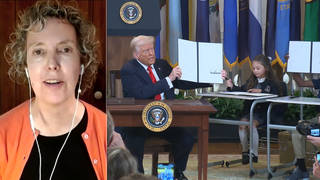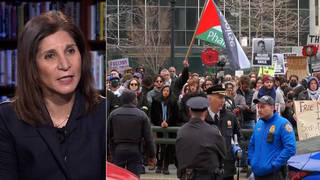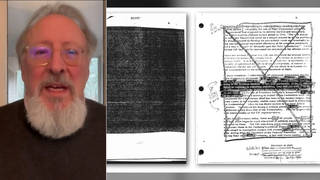
In 2013, more than 1,000 people were arrested in North Carolina taking part in a series of protests called “Moral Mondays.” For 13 weeks, demonstrators rallied in the state capital of Raleigh to fight moves by Republican lawmakers to attack voting rights, education, the environment, healthcare and women’s rights. Now organizers are planning their largest protest yet — the Moral March on Raleigh, scheduled for February 8. The protests in North Carolina are the focus of a recent special on Bill Moyers’ show “Moyers & Company.” The documentary, “State of Conflict: North Carolina,” reveals how untraceable political donations called “dark money” have pushed North Carolina far to the right politically and how citizen protesters are fighting back. We air an extended excerpt of Moyers’ report.
Moyers joins us in studio to talk about this investigation and much more. Click here to watch.
Transcript
AMY GOODMAN: In 2013, over a thousand people were arrested in North Carolina taking part in a series of protests called Moral Mondays. For 13 weeks protesters rallied in the state capital of Raleigh to oppose moves by Republican lawmakers to attack voting rights, education, the environment, healthcare and women’s rights. Now organizers are planning their largest protest yet: the Moral March on Raleigh, scheduled for February 8th, a week from Saturday.
We turn now to State of Conflict: North Carolina, a new documentary report from Bill Moyers. It was aired on his show, Moyers & Company. The documentary reveals how dark money has pushed North Carolina to the right politically and how citizen protesters are fighting back. Later in our broadcast, Bill Moyers will join us here in our studio, but first an extended excerpt from his report.
BILL MOYERS: A Monday in July, Raleigh, North Carolina, a procession moves toward the Statehouse.
REV. WILLIAM BARBER: Forward together!
CROWD: Not one step back!
REV. WILLIAM BARBER: When it comes to education, what do we do?
CROWD: We fight! We fight! We fight!
REV. WILLIAM BARBER: When it comes to healthcare, what do we do?
CROWD: We fight! We fight! We fight!
CHIEF JEFF WEAVER: My name is Chief Weaver with General Assembly police. This is unlawful assembly. You have five minutes to disperse and leave the property.
CROWD: We fight! We fight! We fight!
BILL MOYERS: Once inside, they block doors and passageways, knowing it will get them arrested. They are part of a movement that’s become known as Moral Mondays.
WOLF BLITZER, CNN: Thousands rallying, protesting at the North Carolina Statehouse for weeks.
TAMRON HALL, MSNBC: What’s being called Moral Monday. It’s a protest against the state’s Republican governor.
JIM ACOSTA, CNN: At the Moral Mondays protests here in Raleigh, North Carolina.
REV. WILLIAM BARBER: In a state like North Carolina, in the South, turn to your neighbor and say, “We in the South.”
CROWD: We in the South.
REV. WILLIAM BARBER: Tell the media, “This ain’t Wisconsin.”
CROWD: This ain’t Wisconsin.
REV. WILLIAM BARBER: This is the South.
CROWD: This is the South.
REV. WILLIAM BARBER: Where justice was hammered out.
CROWD: Where justice was hammered out.
REV. WILLIAM BARBER: Where freedom was hammered out.
CROWD: Where freedom was hammered out.
REV. WILLIAM BARBER: This is the South.
JACKIE HYLAND, WRAL: More than a dozen protesters are still in police custody, hours after taking a stand with…
BILL MOYERS: The protests began with a small gathering on a Monday in April. Then, their numbers started growing, Monday after Monday.
BEAU MINNICK, WRAL: Each week there are more arrests than the week before. Tonight there were 49.
BILL MOYERS: The rallies kept growing through the spring and the hot Carolina summer.
DEBRA MORGAN, WRAL: The 13th wave of the Moral Monday protests, crowds grew so large police had to shut down a portion of Lane Street in downtown Raleigh.
BILL MOYERS: By August, citizens were turning out in town after town across the state.
ABC 13 REPORTER: Asheville police telling us 5,000 or more gathered here in downtown Asheville.
BILL MOYERS: And the nation was taking notice.
JONATHAN SERRIE: Moral Monday organizers say the media attention they’re generating outside the General Assembly makes up for much of the political power they lack on the inside.
BILL MOYERS: The protesters are challenging a relentless right-wing crusade to remake the laws of the state.
SCOTT PELLEY, CBS: In North Carolina, they are trying a new way to get people back to work: They’re cutting off unemployment benefits.
ALEX WAGNER, MSNBC: North Carolina passed one of the most restrictive voter suppression bills.
LARRY STOGNER, ABC 11: Lawmakers in the Statehouse and Senate just voted to prohibit expansion of Medicaid.
STEVE DANIELS, ABC 11: Executions will soon resume here in North Carolina.
BILL McGINTY, WCNC-TV: Dropping the state income tax and adding a higher sales…
BILL MOYERS: For the first time in almost 150 years, Republicans control the governorship and both houses of the Legislature, where they have a veto-proof majority. And they are using their monopoly of power to enact laws The Charlotte Observer says “will touch every North Carolinian’s pocketbook, every student’s classroom and every voter’s experience at the polls.”
BOB ZELLNER: The extreme right wing, they have overstepped so far.
VICKI RYDER: They seem to be targeting those who can least afford to pay for these changes.
MORAL MONDAY SPEAKER 1: We’ve just kicked 71,000 of our neighbors off of the benefits that keep roofs over their head and food on their table.
MORAL MONDAY SPEAKER 2: What they are doing to public education is a travesty.
MORAL MONDAY SPEAKER 3: The Legislature wants to lower the age that we can be tried as adults to 13.
CROWD: Day or night, we stand for what is right!
MORAL MONDAY SPEAKER 4: We are here to save the soul of our state.
ROSANELL EATON: At the age of 92, I am fed up and—and fired up! Say, “Fed up!”
CROWD: Fed up!
ROSANELL EATON: Fired up!
CROWD: Fired up!
ROSANELL EATON: Fed up!
CROWD: Fed up!
ROSANELL EATON: Fired up!
CROWD: Fired up!
ROSANELL EATON: Thank you so very much.
ADAM HOCHBERG: North Carolina has in some ways a bipolar political culture.
BILL MOYERS: Adam Hochberg teaches journalism at the University of North Carolina in Chapel Hill.
ADAM HOCHBERG: A lot of people from outside North Carolina, when you say North Carolina, the first thing they think of is Jesse Helms, who was of course a stalwart of the hard right and was our senator here for more than 20 years.
SEN. JESSE HELMS: Homosexuals, lesbians, disgusting people marching in our streets, demanding all sorts of things, including the right to marry each other.
ADAM HOCHBERG: On the other hand, North Carolina is the home of a lot of progressive politicians. At the same time that Jesse Helms was in the Senate in the ’80s, Terry Sanford was his counterpart in the Senate, who is one of best-known Southern progressive liberals.
SEN. TERRY SANFORD: We need to remind ourselves that protest, even obnoxious and blood-boiling protest, is the fundamental ingredient of a free people.
REV. WILLIAM BARBER: Our state constitution says the only qualification to vote…
BILL MOYERS: Today, the state’s progressive leader is William Barber. Before the right-wing takeover, his coalition had pushed for a string of successful reforms, including raising the minimum wage and measures increasing voter participation.
REV. WILLIAM BARBER: Because this right to vote, and the fight for it, is not just political, it’s personal.
ADAM HOCHBERG: Reverend William Barber is the head of the North Carolina NAACP. He is a—he is a man, if you’re ever in the room with him, you’ll know he’s in the room.
REV. WILLIAM BARBER: And we have come to serve notice that we will unleash every political, legal and moral strategy that we can to create the new South. But we will not go back.
Well, fundamentally, America constantly finds itself in—where the question is a moral question: How are we going to live out our deepest moral principle of doing justice, loving your neighbor, and what does that mean in terms of our laws and our public policy?
BILL MOYERS: Barber was arrested on the first Moral Monday back in April. On the news, he declared he was protesting an avalanche of extremist policies.
REV. WILLIAM BARBER: That threaten healthcare, that threaten education, that threaten the poor.
SUE STURGIS: One of the things that particularly upset people is we saw cuts to long-term unemployment assistance.
BILL MOYERS: Journalist Sue Sturgis covers North Carolina politics for the progressive Institute for Southern Studies in Durham.
SUE STURGIS: It wasn’t a lot of money in the first place, but it was a safety net. And so, one of the things we’ve seen as part of the agenda that’s now being played out in Raleigh is constant snips and cuts and tears to that social safety net. It’s no longer a priority for the people who control the state.
ABC 11 NEWSCASTER: Thirty-one yeses and 17 nos, the vote tonight on Senate Bill 4 to block the expansion of Medicaid.
BILL MOYERS: The Republican refusal to expand Medicaid meant denying health insurance to half a million people.
REV. WILLIAM BARBER: How can you stand up and say, “I just cut 500,000 people’s access to Medicaid, and it’s the moral thing to do”?
DR. CHARLES VAN DER HORST: They decided that they’re not going to expand Medicaid. And this was going to do great damage to my patients. And so I take that very personally that I’m not a person who just takes care of hearts and livers, but I need to take care of their—the whole body and the whole person.
BILL MOYERS: Dr. Charles van der Horst is an infectious disease specialist at the University of North Carolina.
DR. CHARLES VAN DER HORST: What had happened is that April 29th, Reverend William Barber had had a rally against these policies. So I thought, hmm, I should check this out. So, on Monday, May 6, I went along and ended up doing civil disobedience and getting arrested.
WOMAN IN MORAL MONDAY CROWD: Thank you, Dr. van der Horst!
DR. CHARLES VAN DER HORST: And I deliberately made some decisions in subsequent rallies that I—I stand next to him. I wanted there to be an old white guy in a white coat with a stethoscope standing next to him.
REV. WILLIAM BARBER: We’re going to walk together.
CROWD: Walk together.
REV. WILLIAM BARBER: And go forward.
CROWD: And go forward.
REV. WILLIAM BARBER: Until.
CROWD: Until.
REV. WILLIAM BARBER: Until.
CROWD: Until.
REV. WILLIAM BARBER: Love is lifted.
CROWD: Love is lifted.
REV. WILLIAM BARBER: Until.
CROWD: Until.
REV. WILLIAM BARBER: Justice is realized.
CROWD: Justice is realized.
REV. WILLIAM BARBER: Don’t ask us…
ARI BERMAN: He’s trying to build a multi-issue, multi-racial coalition in North Carolina.
BILL MOYERS: Ari Berman has been covering the Moral Mondays movement.
ARI BERMAN: There’s this feeling that social justice is under attack and that people have to get in the streets to make people care, to dramatize what’s happening in the state.
PROTESTERS: Same struggle, same fight! Gay, straight, black or white! Same struggle, same fight!
AMY GOODMAN: An excerpt of the documentary State of Conflict: North Carolina. Its narrator is the legendary broadcaster Bill Moyers. When we come back, we’ll air more of the documentary and then speak to Bill himself. Stay with us.
[break]
AMY GOODMAN: State of Conflict: North Carolina, that’s the name of a new documentary report by legendary broadcaster Bill Moyers, host of Moyers & Company on PBS. Later in the show, Bill Moyers will join us here, but first we return to this report on the political crisis in North Carolina. This part looks at Art Pope, the man who’s been described as the mastermind of the right-wing takeover.
BILL MOYERS: The conservative ideology the Moral Mondays protesters are fighting isn’t new. What’s new is that just about everything on the right-wing wish list for the past four decades is at last becoming reality—just as Art Pope planned.
BILL MAHER: What happened in North Carolina? Well, his name is Art Pope. That’s what happened.
ART POPE: I’m Art Pope, and I’m a job creator.
PROTESTERS: Hey hey, ho ho, Art Pope has got to go!
BILL MOYERS: In public, the man most often fingered as the mastermind of the right-wing takeover presents himself as just a low-key member of the governor’s Cabinet, running the numbers like an earnest accountant.
ART POPE: This budget anticipates revenue-neutral tax reform.
BILL MOYERS: He’s self-effacing.
ABC 11 NEWSCASTER: Are you the rainmaker of the North Carolina Republican Party?
ART POPE: No, the voters are the rainmakers of the North Carolina Republican Party.
BILL MOYERS: But Art Pope wields so much power here that he’s been called everything from kingmaker to king. Pope is very, very rich, and he has shelled out so many millions of dollars for conservative causes and Republican candidates that his adversaries accuse him of buying the state government. Pope claims that’s not what the money’s for.
ART POPE: Of course I think it has an impact. But the impact is educating the voters on the issues so they hear both sides of the issues, not just one side.
JANE MAYER: There are wealthy individuals who have outsized influence in many states. Usually there’s a handful of them.
BILL MOYERS: Jane Mayer of The New Yorker was the first national journalist to investigate Pope’s power.
JANE MAYER: But he really dominates the landscape in North Carolina in a way that nobody else does.
BILL MOYERS: That’s because he practices the golden rule of modern politics: He with the gold rules. And Art Pope has the money—his own, his company’s money and money from the John William Pope Foundation, named for his wealthy businessman father. That single foundation has spent some $46 million on a network of advocacy groups and think tanks bent on steering North Carolina far to the right. Sound familiar?
SUE STURGIS: When people talk about Art Pope, someone who’s often invoked are the Koch brothers, David and Charles Koch, who also run a privately held company and spend a great deal to promote their particular brand of libertarian politics. And he’s very close to the Kochs. He served as a board member of Americans for Prosperity, which is a conservative policy advocacy group that was founded and is funded by the Koch brothers.
JANE MAYER: In some ways, Art Pope is sort of a junior-sized version of the Koch brothers. He has what some people call kind of a factory production line for his ideology. The people that work for his think tanks are on the radio, they have websites, they have publications that are statewide. They get their message out all the time.
BILL MOYERS: Like this message, aimed right at the Moral Mondays protesters.
FRANCIS DE LUCA: Backed by a supportive liberal media, hundreds have been arrested for disrupting the state Legislature.
BILL MOYERS: It accuses protest leaders of marching to protect access to government handouts.
FRANCIS DE LUCA: These organizations are fighting to keep their spot at the public trough. Welcome to Money Mondays.
BILL MOYERS: Francis De Luca once ran the North Carolina chapter of the Koch brothers’ Americans for Prosperity. He’s now head of the John William Pope Civitas Institute.
FRANCIS DE LUCA: So Civitas Institute is heavily funded by the Pope Foundation, but I can tell you, having now worked at Civitas for seven years and run it for almost six years, Art Pope’s control over Civitas is very little. He likes policy. I always try to describe Art as a policy wonk. He believes in a vigorous debate, even among his different groups. If you check, you will notice that our groups do not always agree. The groups he’s fund do not always agree on policy.
BILL MOYERS: Perhaps not always, but certainly often enough. For example, on cutting tax rates for corporations and the rich, which is exactly what the state recently did. By 2015, the highest-earning North Carolinians will pay almost 26 percent less in income taxes than they did in 2013. Corporations will pay over 27 percent less. There’s also been a repeal of the estate tax, which applied only to people so wealthy that just 23 families had paid it in the year 2011. When corporate and wealthy interests are at stake, Art Pope is right at home.
Where did Art Pope get the money, and the ideas, that have reshaped the politics of North Carolina? The story begins when he was a young man.
JANE MAYER: He was a very intellectual kid. And very early on, he went to a summer program that was run by the Cato Institute, the libertarian think tank, and he was quite swept up with libertarian ideology and the ideas of Ayn Rand. Once he was through college and he went to Duke Law School, he eventually became the general counsel in the family firm, and then he rose in the firm.
BILL MOYERS: All the way to the top, becoming CEO of that family firm.
SUE STURGIS: It’s a privately held company called Variety Wholesalers. It was started by his forebears. It’s a discount retail chain.
ADAM HOCHBERG: These are usually lower-end discount stores than a Target or even a Wal-Mart or a Kmart store. They go by a variety of different names. One of the largest chains he owns is called Roses. There’s one called Maxway. He has great personal wealth and great family wealth.
JANE MAYER: And he had great political ambitions.
SUE STURGIS: Pope served in the Legislature for several terms back in the 1980s and into the ’90s.
ADAM HOCHBERG: Art is a—he’s a very bright man, and he knows the state budget, and he knows numbers inside and out, but he is not what you call the stereotypic political candidate—you know, the smiling telegenic politician. And after a couple years, he ran for lieutenant governor and lost, badly. And he realized he was not going to influence North Carolina politics by being lieutenant governor or governor. He was just unlikely to get elected.
BILL MOYERS: Turns out he didn’t need to get elected to win elections. He just had to put his money where it counted. He first set out to purge moderate Republicans from the state Assembly by supporting candidates to their right in GOP primaries. And then, in 2010, he took on the Democrats, who played right into his hands.
SUE STURGIS: The Democrats were in disarray in 2010. There had been a series of scandals in the party, corruption scandals.
BILL MOYERS: A Democratic governor had pled guilty to a felony campaign finance charge. And that wasn’t all.
ADAM HOCHBERG: We had a Democratic speaker of the House go to prison on a bribery scheme. I mean, there was a lot of—a lot of sleaze in the Democratic Party. We saw a backlash against President Obama and “Obamacare,” which is the same thing we saw nationally. We saw frustration over a lousy economy, which was the same thing we saw nationally.
SUE STURGIS: Also, that election was right after the Citizens United Supreme Court decision that opened up the door to outside money.
BILL MOYERS: That Citizens United decision, the handiwork of the conservative majority on the Supreme Court, enabled corporations and individuals to spend unlimited amounts of often untraceable money—what’s now called “dark money.”
JANE MAYER: He provided a perfect example of how the landscape had changed after the Citizens United Supreme Court ruling.
ART POPE: Well, break those numbers up.
JANE MAYER: He saw the opportunities, and he had the cash because of his family fortune. Art Pope is a very smart man who is—almost thinks about the world almost like an engineer. And it’s as if somebody had looked at the map in every single district and figured out what it would take to get Republican control. And so, he, along with some of the people he was working with, targeted legislative races to pour money into.
BILL MOYERS: One of their vessels was a front group called Real Jobs NC. Co-founded by Art Pope and bankrolled by one of his companies and a national Republican group, its real job was to demolish the other side. And in 20l0, it went on the attack.
REAL JOBS NC CAMPAIGN AD 1: Putting Raleigh Liberals first.
REAL JOBS NC CAMPAIGN AD 2: Their high taxes and wasteful spending cost us jobs.
REAL JOBS NC CAMPAIGN AD 3: Her priorities are costing us jobs.
REAL JOBS NC CAMPAIGN AD 4: Real Jobs NC sponsored this ad.
SUE STURGIS: That year, he and his family and also the outside spending groups that he’s associated with spent $2.2 million on state legislative races.
JANE MAYER: Which in the national scheme of things is not a tremendous amount of money, but in the context of a state and in the context of state legislative races, where really there’s not usually that much money spent, it was decisive.
WRAL NEWSCASTER: Tonight’s shift in power is historic. The Republicans have taken control of both chambers for the first…
LARRY STOGNER, ABC 11: Republicans are now in control for the first time in more than a century.
ABC 11 NEWSCASTER: So how big of a role does Pope himself think he played?
ART POPE: I supported 19 Republican legislative candidates that I contributed to, and 17 of those won.
ABC 11 NEWSCASTER: That’s a pretty good track record.
ART POPE: I’m glad.
ADAM HOCHBERG: The 2010 election, Republicans got control of both houses of the state Legislature, first time since just after the Civil War.
SUE STURGIS: And the Republicans were very smart. You know, they realized that there was an opportunity there. Whoever controlled the Legislature in 2010 would control the state’s political future.
BILL MOYERS: The winners would control the future because 2010 was a census year, the first in a decade.
ADAM HOCHBERG: That means they get to control the redistricting process. So, as you can imagine, that’s an opportunity for legislators to do some pretty self-serving things. And it was the same thing when Democrats were in charge. With computers nowadays, you can get very specific about every house that’s included in the district, and you can know what’s a Republican neighborhood, what’s a Democratic neighborhood, so you can look up at an individual house and say, “OK, the man of the house is a Republican, and the lady of the house is a Democrat, and I see they have one adult son living at home, and he’s also a Republican.” I mean, you can do it to that level. And you can draw districts in such a way that pretty much foretells which party is going to control that district. And what the Republicans did was draw districts as best they could to elect Republicans.
BILL MOYERS: They had help, according to the investigative group ProPublica, help in the form of dark money from outside sources and Republican operatives coming down from Washington to help figure out the boundaries most favorable to their party. But there was someone else in the room, too: Art Pope. One person present told ProPublica, “We worked together at the workstation. … He sat next to me.” When the next election came around, 2012, the gerrymandering worked like a charm.
ADAM HOCHBERG: The 2012 election occurs, and it is the best election for Republicans in modern history in North Carolina. They take not just control of both houses of the state Legislature—and they had not done that in a century—but they take overwhelming control. They take a veto-proof majority control of both houses of the Legislature. They also get the governor’s mansion back for the first time in 20 years.
GOV. PAT McCRORY: Let’s forget about politics for a while and think about us. That’s what we tried in Charlotte when I was mayor.
BILL MOYERS: As mayor of Charlotte, Pat McCrory was known to be a fiscal conservative, but on other issues, fairly moderate, for a Southern Republican.
GOV. PAT McCRORY: I’m Pat McCrory, and I’m running for governor.
ADAM HOCHBERG: Governor McCrory, in one of the debates before the 2012 election, was specifically asked by somebody on the panel in a televised debate, “Would you sign any measures to further restrict abortion in North Carolina?” And he said flat-out, “No.”
LAURA LESLIE: If you’re elected governor, what further restrictions on abortion would you agree to sign? I’ll start with you, Mr. McCrory.
GOV. PAT McCRORY: None.
LAURA LESLIE: All right.
BILL MOYERS: But once in office, McCrory swung hard to the right, beginning with the casual announcement of a key appointment.
GOV. PAT McCRORY: Art Pope has agreed to serve as my deputy budget director.
BILL MOYERS: Say what?
GOV. PAT McCRORY: Art Pope has agreed to serve as my deputy budget director.
BILL MOYERS: An innocuous title, masking a startling reality. The man who for years had poured money into those right-wing think tanks into the Republican Party and into Republican campaigns, including Pat McCrory’s, would now be the governor’s man overseeing the state budget.
VICKI RYDER: His power is tremendous and very frightening to me that people can buy their way into that kind of power in what’s supposed to be a people’s democracy.
THE RAGING GRANNIES: We’re the Raging Grannies…
BILL MOYERS: Vicki Ryder sings at Moral Monday protests with a group called The Raging Grannies.
THE RAGING GRANNIES: To think that men in suits might take our voting rights away.
BILL MOYERS: Several years ago, she moved from New York to North Carolina.
VICKI RYDER: After my husband and I retired, we were looking for a place to live that would be supportive of our values. And the Triangle region of North Carolina seemed to be a good fit for us. So, we have just been shocked by how quickly things have turned from a very progressive atmosphere to one of extraordinary regression.
BILL MOYERS: Conservatives were getting the results they had been praying for. Some examples: Seventy-five percent of the tax cuts went to the top 5 percent of taxpayers. Anyone making more than, say, $250,000 a year would now pay a state income tax rate at the same level as those making $25,000. Earned income tax credits for the poor were cut. Budgets were cut for at-risk kids in pre-K, even as vouchers were given to private schools. Unemployment insurance was cut—with a bill drafted by the North Carolina Chamber of Commerce. And in Art Pope’s budget, the state’s higher education system took a hit of $64 million.
ADAM HOCHBERG: You’ve traditionally had a lot of support for education in North Carolina, especially for a Southern state. And I think it’s something that a lot of North Carolinians take pride in, not just, you know, pointy-headed liberal intellectuals, but a lot of people in the business community, too. And I don’t think you’ll find even among Republican business leaders this attitude of marginalizing higher education that you have seen from the state capital. One of the first things that Governor McCrory did, one of the first controversies he got involved with as governor, is he went on a conservative radio show, a national show, and took some swipes at the university and said there are too many degrees in liberal arts. And he said, “If you want to get a degree in gender studies, go to private school and do it. The people of North Carolina don’t want to pay for that.”
GOV. PAT McCRORY: That’s a subsidized course. And frankly, if you want to take gender studies, that’s fine, go to a private school and take it, but I don’t want to subsidize that if that’s not going to get someone a job.
AMY GOODMAN: North Carolina Governor Pat McCrory. That’s an excerpt from Bill Moyers’ documentary report North Carolina: Battleground State, produced by Tom Casciato. When we come back, the legendary broadcaster himself, Bill Moyers, joins us in studio. Stay with us.











Media Options